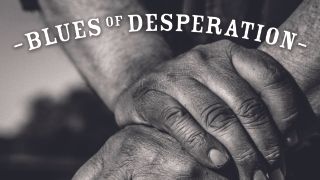A fistful of classy songs – but no FM-ready signature tune.
THE INDEFATIGABLE Joe Bonamassa shows no sign of easing up any time soon. The past four years have seen him involved in a dozen releases. These include two solo studio albums and five live CD/DVDs, one of which features four different London shows. There were also five collaborations; a couple with Beth Hart, one with Mahalia Barnes (daughter of Jimmy) paying tribute to the songs of funk singer Betty Davis, a likely last throw of the dice with hardrock supergroup Black Country Communion and an altogether more challenging adventure with Rock Candy Funk Party.
This year, though, it seems that Bonamassa’s focus is squarely on his solo career – and on the basis of this latest release, that’s no bad thing. Blues Of Desperation is the follow-up to 2014’s Different Shades Of Blue and Bonamassa, who has written all the songs, has once again turned to producer Kevin Shirley, with whom he has been joined at the hip in the studio since his breakthrough with Sloe Gin and The Ballad Of John Henry a decade ago.
Shirley’s role involves shaking Bonamassa out of whatever comfort zone he may have reached with his touring band by hiring top-notch session musicians to record with him. Some of those names are becoming familiar, so Shirley has upped the ante this time by adding a second drummer to jolt them out of any complacency. The recording sessions, in Nashville, were short and sweet (plainly, this is a man who doesn’t have time to hang around…).
The impact is immediate from the fierce pounding rhythm that drives This Train, with Bonamassa straining every vocal sinew trying to keep up with the music. And he scarcely has time to draw breath before powering into the steadier but heavier Mountain Climbing with its exquisite woman-tone solo. Indeed, the eclectic range of tones that he employs across the album does much to lift the songs out of their comfort zones, nowhere more so than on the title track with its wah guitar and low, menacing riffs while Bonamassa’s voice takes on a Howlin’ Wolf rasp.
It’s one of half a dozen new tracks that should beef up Bonamassa’s live sets and jostle for inclusion in any list of fan favourites. Other moments to hook the listener include ballads like No Good Place For The Lonely and How Deep This River Runs, and rockers like You Left Me Nothin’ But The Bill And The Blues and Distant Lonesome Train. And it would be nice to think he could make a little elbow room at forthcoming shows for the gospel-tinged The Valley Runs Low or the slowbuilding Drive, where his guitar walks a line between Duane Eddy and Peter Green.
He’s never been prone to missteps, and Blues Of Desperation keeps Joe Bonamassa’s career firmly on course. If there’s a criticism, it’s that this album doesn’t have the one big crossover song that could transform his trajectory, particularly in the United States. For that, he needs to keep looking.



